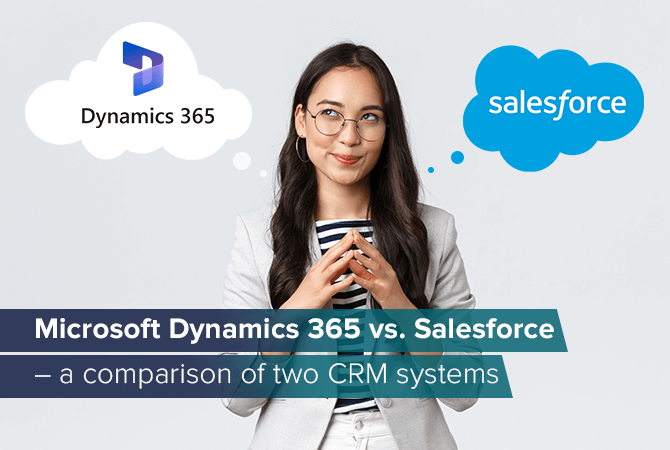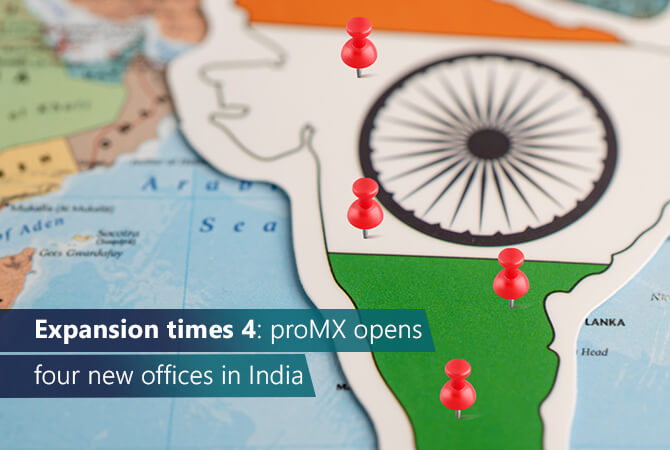
Microsoft Dynamics 365 vs. Salesforce – a comparison of two CRM systems
Content
CRM software is among the fastest growing business applications. Thus, it is no wonder, that there are many out there, for example SAP’s CRM, Pipedrive or Monday.com.
In this article, we focus on two of the biggest players in the CRM market: Salesforce and Microsoft Dynamics 365. We will have a look at their similarities and differences, and attempt a comparison.
What is Microsoft Dynamics 365?
Microsoft Dynamics 365 isn’t one set CRM solution. It rather comprises a range of different business applications for sales, marketing, project management and other purposes. These can either be used as stand-alone solutions or combined. Either way, they all have one common data basis. That ensures, that every employee works with the same up-to-date data. Microsoft Dynamics 365 Sales is the perfect CRM solution for sales teams.
What is Salesforce?
Salesforce is a cloud-based Customer Relationship Management for companies. The Sales Cloud is the basis for customer management. Here, too, you can add the Marketing Cloud or the Service Cloud for more functionalities. Like in Dynamics 365, all relevant data is stored centrally and thus available for all Salesforce applications.
Differences between Microsoft Dynamics 365 and Salesforce
Before we dive into several aspects more deeply, we want to provide you with a broad overview first:
 | | |
| Core features | Contact management (leads, opportunities, existing customers) | Contact management (leads, opportunities, existing customers) |
| Reporting and analysis | Default dashboards are limited, but seamless integration with Power BI possible | Visualize data flexibly in different forms and move them around via drag and drop |
| Artificial Intelligence | Embedded in the system | Available as paid add-on „Salesforce Einstein“ |
| Extensions | Wide range of third-party apps in Microsoft’s app store AppSource | Wide range of third-party apps in Salesforce’s app store AppExchange |
| Integrations | Many Microsoft solutions available to be integrated natively | Limited number of solutions to be integrated without connectors |
| Customizations | Developers can do customizations with Javascript.Net and HTML | Developers need to use Salesforce’s proprietary programming language Apex |
| Support | By Microsoft partners | Inhouse |
| Costs | $65 to $162 per user/month for Dynamics 365 Sales | $25 to $300 per user/month for Sales Cloud |
Features
The core features for customer relationship management in Sales Cloud and Microsoft Dynamics 365 are similar. Both systems let you manage your leads and opportunities, and collect and access all contact information. Another common feature is the creation of sales predictions which you then can compare with goals and KPIs. You can do the same with actual data like revenue or sales numbers.
Regarding the out-of-the-box reporting and analysis functionalities, Salesforce brings more to the table. But the reporting tool Microsoft Power BI can be connected to Dynamics 365 seamlessly and provide you with almost endless possibilities to display and evaluate your data.
Both systems use artificial intelligence to recognize trends early and to suggest ways to interact with your contacts. It is said that Salesforce’s AI named Einstein is particularly good. But it comes at a price since you need to buy it as an add-on. Microsoft‘s nameless AI, on the other hand, is embedded in Dynamics 365.
Extensions
Both Salesforce and Microsoft have their own app store. On the platforms App Exchange (Salesforce) and AppSource (Microsoft) users find a variety of third-party apps to complement, extend or specify their solutions.
Furthermore, Microsoft offers a range of useful solutions that can be integrated natively and thus seamlessly in Dynamics 365. Among them are the productivity applications of Microsoft 365 (formerly Office 365), the aforementioned business intelligence tool Power BI and further Dynamics 365 modules such as Dynamics 365 Marketing or Project Operations. The social business platform LinkedIn can also be incorporated into Dynamics 365 with the LinkedIn Sales Navigator.
Selection of extensions for Dynamics 365:
- Outlook
- Word, PowerPoint and Excel
- Power BI
- Dynamics 365 Marketing
- Dynamics 365 Customer Service
- Power Platform
- Teams
Salesforce, too, provides more functionalities that can be integrated seamlessly, for example via the Marketing Cloud or the Service Cloud. But by far not as many as Microsoft. Solutions from third-party providers can only be connected using paid connectors.
Selection of extensions for Salesforce:
- Marketing Cloud
- Service Cloud
- Salesforce Einstein
- Slack
Both firms offer a useful collaboration platform for (video) calls, chats, data exchange and more. Microsoft developed their platform called Teams in 2017, while Salesforce overtook the existing platform Slack in 2021.
Customization
Your requirements for your CRM solutions are very specific and neither the out-of-the-box functionalities nor the existing extensions are cut out to fulfill them? Sounds like a job for a developer.
Microsoft uses the standard programming languages Javascript.NET and HTML. But even without programming skills you will be able to develop your own business applications, automate processes and more. This is possible thanks to the low code and no code applications of the Microsoft Power Platform.
Are you curious now to learn more about the Power Platform? Head to our article on the topic.
You can individualize almost everything in Salesforce’s user interface. For deeper changes to the system, however, you not only need a developer, but one that knows Salesforce’s proprietary language Apex, too.
Support
Salesforce provides their customers with inhouse support, which means: Salesforce employees are the ones introducing new users to the systems and assisting them with any problems or questions. In the world of Microsoft, Microsoft partners like us, proMX, usually do that.
Microsoft promises an uptime of 99,9 % in their Service Leve Agreement (SLA). Salesforce only enters into SLAs with its customers on demand and at an additional cost.
Costs and licenses
One, or rather two questions remain: How much does Dynamics 365 cost? How much does Salesforce cost?
With both providers you have the choice between four plans ranging from basic usage to premium usage. Per user and month you need to pay between $65 and $162 for Dynamics 365 Sales. The Salescloud starts off cheaper but the premium option is much more expensive: the price ranges from $25 to $300 per user/month for Sales Cloud.
It comes as no surprise, though, that the prices change depending on the additional modules you purchase. Therefore, licensing is rather complex for both solutions.
Another thing you should take into consideration is that in the case of Microsoft Dynamics 365, Microsoft partners often have discounts on licensing packages.
Conclusion
Both customer relationship management solutions are on the market for good reasons. Like with most technologies, in the end it depends on the needs and expectations of the users which one is better suited for them. Details that are minor for one company may be decisive for the other.
One reason why Salesforce is leading in the CRM market is probably that they disrupted the market with a CRM tool as Software as a Service (SaaS) 20 years ago. By comparison, Microsoft only launched Dynamics 365 in 2016, when neither SaaS nor CRM solutions were new anymore. Arguments for Salesforce are also the comprehensive reporting possibilities and that you are highly flexible in designing the solution to your gusto.
Especially when you are already using Microsoft products in your company, for example Microsoft 365 or Teams, we recommend you Microsoft Dynamics 365 to guarantee a smooth integration. The Power Platform offers endless possibilities to set up your Dynamics 365 solution in a way that allows your teams to work most effectively. Small and medium-sized businesses are offered a high level of flexibility in terms of licensing for Dynamics 365.
As a Microsoft partner, our recommendation is Microsoft Dynamics 365. Because we work with it every day, we are familiar with its many great assets. We would be happy to help you discover how your company can benefit from them – let’s talk!
FAQ
If your company is already using Microsoft products of any kind, we recommend Microsoft Dynamics 365.
No. They are both CRM solutions, but from different providers. The core features are similar for both, but if you look at details or other aspects like integration or licensing options there are differences.
Generally, both Salesforce and Microsoft Dynamics 365 are available for businesses of any size. Microsoft Dynamics 365 is more flexible in terms of putting together an individual solution as well as licensing. That can be an advantage for smaller companies.













